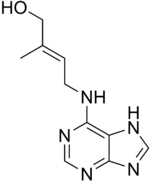Zeatin
 | |
| Names | |
|---|---|
| IUPAC name
(E)-2-methyl-4-(7H-purin-6-ylamino)but-2-en-1-ol | |
| Identifiers | |
| 1637-39-4 | |
| 3D model (Jmol) | Interactive image |
| ChEBI | CHEBI:16522 |
| ChemSpider | 395716 |
| PubChem | 449093 |
| |
| |
| Properties | |
| C10H13N5O | |
| Molar mass | 219.25 g·mol−1 |
| Appearance | Off-white to yellow crystalline powder |
| Melting point | 208 to 210 °C (406 to 410 °F; 481 to 483 K) |
| Solubility in 1M NaOH | Soluble |
| Hazards | |
| Lethal dose or concentration (LD, LC): | |
| LD50 (median dose) |
2200 mg/kg (mouse, transperitoneal) |
| Except where otherwise noted, data are given for materials in their standard state (at 25 °C [77 °F], 100 kPa). | |
| | |
| Infobox references | |
Zeatin is a plant hormone derived from adenine. Zeatin belongs to the family of plant-growth hormones called cytokinins and was discovered in immature corn kernels from the genus Zea. It promotes growth of lateral buds and when sprayed on meristems stimulates cell division to produce bushier plants.
Zeatin and its derivatives are the active ingredient in coconut milk, which causes plant growth.[1]
Zeatin has several anti-aging effects on human skin fibroblasts.[2]
Toxicology
The acute transperitoneal toxicity in mice (LD50) is 2200 mg/kg.
Application
Zeatin has a variety of effects including:
- Promotes callus initiation when combined with auxin, concentration 1 ppm.
- Promotes fruit set. Zeatin 100 ppm + GA3 500 ppm + NAA 20 ppm, sprayed at 10th, 25th, 40th day after blossom.
- Retards yellowing for vegetables, 20 ppm, sprayed.
- Causes auxiliary stems to grow and flower.
Zeatin can also be applied to stimulate seed germination and seedling growth.
References
- ↑ David W. S. Mok; Machteld C. Mok (1994). Cytokinins: Chemistry, Activity, and Function. CRC Press. p. 8. ISBN 0-8493-6252-0. (available from Google books)
- ↑ Rattan, S.I.S. & Sodagam, L. (2005). "Gerontomodulatory and youth-preserving effects of zeatin on fibroblasts of human skin.". Rejuvenation Research. 8 (1): 46–57. doi:10.1089/rej.2005.8.46. PMID 15798374.
External links
This article is issued from Wikipedia - version of the 11/10/2016. The text is available under the Creative Commons Attribution/Share Alike but additional terms may apply for the media files.